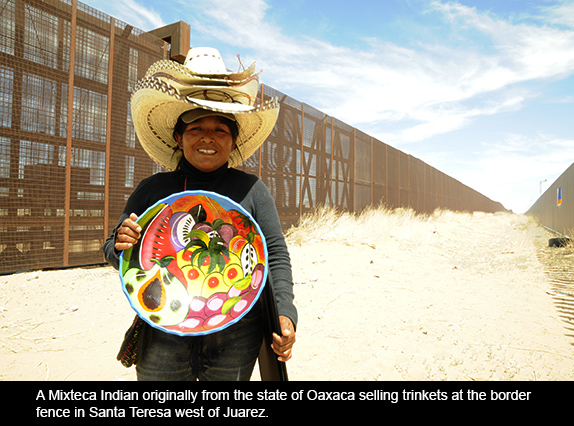Governor Rick Perry orders 1,000 National Guard troops to the US-Mexico border. President Obama urges the Presidents of Guatemala, Honduras and El Salvador to focus on their “shared responsibility” for the influx of migrant children from their countries. But where are Governor Perry’s troops going to go and what are they going to do? And what responsibility does President Obama think we have for this crisis?
Take Perry’s concerns about border security first. For the last four years, I have been going through the Border Patrol checkpoints north of Las Cruces and Columbus, New Mexico as well as making multiple border crossings at places like Juárez, Palomas, Agua Prieta, Naco, Tijuana and Nogales, Mexico or Santa Teresa, New Mexico. Going southward across the border at Santa Teresa or Columbus, for example, or going north through the checkpoints above the border on the US side, what you will encounter is an US officer who asks if you’re a US citizen or maybe just waves you through. Behind him or her, there will be three or four other officers just standing there. Add to this Border Patrol officers parked on hilltops miles from the border or towing harrows along the paths beside remote roads like the one between Columbus and El Paso and it’s a shocking picture of just throwing tax dollars at a problem. In their rush to “out tough” each other, President Obama and the Republicans are squandering billions and now Governor Perry is going to add to it.
What we ought to be doing is focusing on the causes of this “push-pull” effect on the border, not only in regard to immigrants from Mexico but this more recent surge from these very dangerous Northern Triangle countries of Central America - Guatemala, Salvador and Honduras.
Take Mexico first. As an example, Café Justo is a seven employee coffee processing facility in Agua Prieta, Mexico across the border from Douglas, Arizona. The coffee that they buy from farmers in the states of Chiapas and Nayarit in southern Mexico provides employment for some 100 farm families or perhaps as many as 500 or 600 people, all of whom can now make a living in their home country without the economic pressure of having to come north to the US. It’s one of the few efforts I’ve seen aimed at giving people an alternative to migrating. (By the way, the coffee is excellent and you can buy it on line by going to www.justcoffee.org.) A joint US-Mexico effort to expand more small businesses like this would do much more to deter migration than Governor Perry’s troops.

One place to start would be the border crossing at Santa Teresa on the west edge of El Paso and Juárez where a rapidly expanding industrial complex is underway. (This is one of the very few bright spots for the dismal New Mexico economy.) One key issue will be salaries because no one can survive on the maquila wages (the minimum wage is less than $6.00 per day) but, if done right, jobs there could dramatically reduce the pressure either to get involved in crime or to cross the border illegally.

As for the surge of young people from Guatemala, Salvador and Honduras, this has been building for several years so it’s hard to know why anyone is surprised. The causes are best explained by Mary Anastasia O’Grady in her column of July 21 where she says that “Central America is significantly more dangerous than it was before it became a magnet for the rich and powerful drug capos.” For example, not too many years ago I drove all over El Salvador and Guatemala with family members and in 2009 I wandered around Honduras alone. That would be unthinkable today. O’Grady then quotes Marine Corps General John Kelly, the US Commander for the Southern Command who says that “Drug cartels and associated street gang activity in Honduras, El Salvador and Guatemala, which respectively have the world’s number one, four and five highest homicide rates, have left near-broken societies in their wake.” He also refers to the “insatiable U.S. demand for drugs, particularly cocaine, heroin and now methamphetamines, all produced in Latin America and smuggled into the U.S.” This is verified by the fact that many of those fleeing the Northern Triangle countries are going to Nicaragua, a country that is even poorer but much safer.
Why this explosion of criminal activity in these three Northern Triangle countries? Why does Honduras now have a murder rate that is eighteen times higher than ours and four times higher than Mexico’s? The “insatiable US demand for drugs” plus the “balloon effect.” When we pressed down on drug trafficking through the Caribbean, the movement of drugs shifted to land routes through these weak Central American countries. Then, when former Mexican President Felipe Calderón pushed down on drug trafficking in Mexico, cartels set up operations in the Northern Triangle. This is not a new issue. Three years ago, the Consul General from Guatemala in Denver told me that the Zetas, a particularly vicious Mexican cartel, had already taken over northern Guatemala.
What can be done? First, we have to keep O’Grady’s words in mind and stop thinking that our demand for drugs and the flight of young people from the dangers in their countries are two unrelated issues. We have a responsibility here and both Perry and Obama need to recognize it. This means rethinking the impact that our drug war is having, treating the kids who have come here with decency, helping those countries re-establish security and combat the cartels, and finding ways whereby they can develop jobs and alternatives to crime. For example, even though the Honduran murder rate is the world’s highest, a non-profit named Nuevo Amanecer (A New Dawn ) is training some 270 apprentices in various industrial areas. Those who complete the welding program all get jobs. Nuevo Amanecer struggles to raise money to survive; why don’t we shift some of our overspending on border security to programs like it?

This recent crisis is evidence not only of the dysfunction in these Northern Triangle countries but here in the United States as well. Resolving the immigration issue – or even just the pieces everyone seems to agree on like a guest worker program so that workers can come to the US on a temporary basis and do the jobs Americans won’t do in agriculture, construction and the restaurant business – could have enormous benefits for our economy as well as show the world that we can still lead. Maybe this most recent crisis can also become an opportunity but only if leaders like Perry and Obama really lead.



Responses to “The New Immigration Crisis”